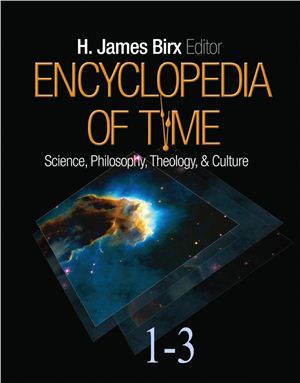SAGE Publications, 2009. - 1632 pages.
Surveying the major facts, concepts, theories, and speculations that infuse our present comprehension of time, the Encyclopedia of Time: Science, Philosophy, Theology, & Culture explores the contributions of scientists, philosophers, theologians, and creative artists from ancient times to the present. By drawing together into one collection ideas from scholars around the globe and in a wide range of disciplines, this Encyclopedia will provide readers with a greater understanding of and appreciation for the elusive phenomenon experienced as time.
Features
Surveys historical thought about time, including those ideas that emerged in ancient Greece, early Christianity, the Italian Renaissance, the Age of Enlightenment, and other periods
Covers the original and lasting insights of evolutionary biologist Charles Darwin, physicist Albert Einstein, philosopher Alfred North Whitehead, and theologian Pierre Teilhard de Chardin
Discusses the significance of time in the writings of Isaac Asimov, Samuel Taylor Coleridge, Fyodor M. Dostoevsky, Francesco Petrarch, H. G. Wells, and numerous other authors
Contains the contributions of naturalists and religionists, including astronomers, cosmologists, physicists, chemists, geologists, paleontologists, anthropologists, psychologists, philosophers, and theologians
Includes artists’ portrayals of the fluidity of time, including painter Salvador Dali’s The Persistence of Memory and The Discovery of America by Christopher Columbus, and writers Gustave Flaubert’s The Temptation of Saint Anthony and Henryk Sienkiewicz’s Quo Vadis
Provides a truly interdisciplinary approach, with discussions of Aztec, Buddhist, Christian, Egyptian, Ethiopian, Hindu, Islamic, Navajo, and many other cultures’ conceptions of time
Key Themes
Biography
Biology/Evolution
Culture/History
Geology/Paleontology
Philosophy
Physics/Chemistry
Psychology/Literature
Religion/Theology
Theories/Concepts
Surveying the major facts, concepts, theories, and speculations that infuse our present comprehension of time, the Encyclopedia of Time: Science, Philosophy, Theology, & Culture explores the contributions of scientists, philosophers, theologians, and creative artists from ancient times to the present. By drawing together into one collection ideas from scholars around the globe and in a wide range of disciplines, this Encyclopedia will provide readers with a greater understanding of and appreciation for the elusive phenomenon experienced as time.
Features
Surveys historical thought about time, including those ideas that emerged in ancient Greece, early Christianity, the Italian Renaissance, the Age of Enlightenment, and other periods
Covers the original and lasting insights of evolutionary biologist Charles Darwin, physicist Albert Einstein, philosopher Alfred North Whitehead, and theologian Pierre Teilhard de Chardin
Discusses the significance of time in the writings of Isaac Asimov, Samuel Taylor Coleridge, Fyodor M. Dostoevsky, Francesco Petrarch, H. G. Wells, and numerous other authors
Contains the contributions of naturalists and religionists, including astronomers, cosmologists, physicists, chemists, geologists, paleontologists, anthropologists, psychologists, philosophers, and theologians
Includes artists’ portrayals of the fluidity of time, including painter Salvador Dali’s The Persistence of Memory and The Discovery of America by Christopher Columbus, and writers Gustave Flaubert’s The Temptation of Saint Anthony and Henryk Sienkiewicz’s Quo Vadis
Provides a truly interdisciplinary approach, with discussions of Aztec, Buddhist, Christian, Egyptian, Ethiopian, Hindu, Islamic, Navajo, and many other cultures’ conceptions of time
Key Themes
Biography
Biology/Evolution
Culture/History
Geology/Paleontology
Philosophy
Physics/Chemistry
Psychology/Literature
Religion/Theology
Theories/Concepts

